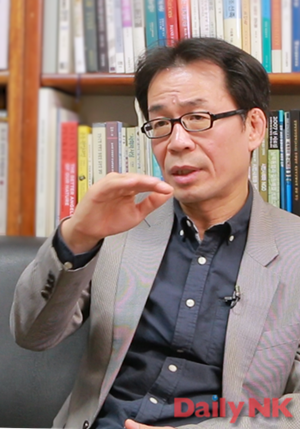Despite the appearance of peace surrounding North Korea’s participation in the Pyeongchang Winter Olympics, the war of nerves with the United States continues. There is continued talk in the US of a preemptive ‘bloody nose’ strike on the North, and North Korea remains staunchly committed to advancing its nuclear weapons systems.
The US seeks denuclearization as a starting point for dialogue, while North Korea seeks recognition from the US as a legitimate nuclear power. Given this difference, a US military strike or other form of military conflict cannot be ruled out. 
“While it does not seem that an attack by the US is imminent, the chances of an armed conflict are high,” said Cho Han Bum (pictured right), senior research fellow at the Korea Institute for National Unification (KINU), in an interview with Daily NK on February 1.
“Tensions are likely to rise again after the Olympics if the US continues putting pressure on the North and intensifying sanctions, to which the North might respond by testing another nuclear bomb or ICBM.”
While rhetoric from the two sides has calmed in time for the Olympics in South Korea, the atmosphere is likely to reverse after the games, given that neither is showing any signs of budging on their opposing stances on the nuclear issue.
“The North will be wary of America’s continued military pressure and sanctions measures, and it is highly likely that Kim Jong Un will decide to carry out weapons tests,” Cho said, adding that the greatest concern now is that tensions will rise to even greater levels this year than in 2017.
Analysts are predicting that a new era of tensions could begin when the US and South Korea resume joint military exercises after the Winter Olympics have finished. The North Korean threat could then be heightened depending on the reactions to these exercises and whether additional strategic weapons tests are carried out.
“Everything depends on how much of the peaceful atmosphere established for the Olympics carries over after the games are finished. If the US and North Korea are able to sit down at the negotiating table because of it, then the Olympics will end up being meaningful towards this end,” Cho said.
“While it is important to recognize the South’s efforts in enticing North Korea to the Olympics, the more important thing will be to bring them to the negotiating table. The task now is to make sure that they can carry this peaceful momentum well beyond the end of the Olympics,” he added.
But in order for the Olympics to lead to long-term improvements in North-South relations, the South must establish negotiations with the US and the North and temper rhetoric on both sides.
Cho believes that in order for South Korean President Moon Jae In to accomplish his administration’s goal of ‘solving the nuclear problem through peaceful talks,’ he must first succeed in ‘taking the driver’s seat on the peninsula’ by getting the US and North Korea to come together for dialogue.
He believes that the two sides must narrow their differences through negotiations for the threat of armed conflict to subside.
“If South Korea stops at merely having succeeded in bringing North Korea to the Olympics, but does not take things a step further, then it will be interpreted as a failure for the administration,” Cho said. “The South must use this opportunity to make strides towards denuclearization.”




















